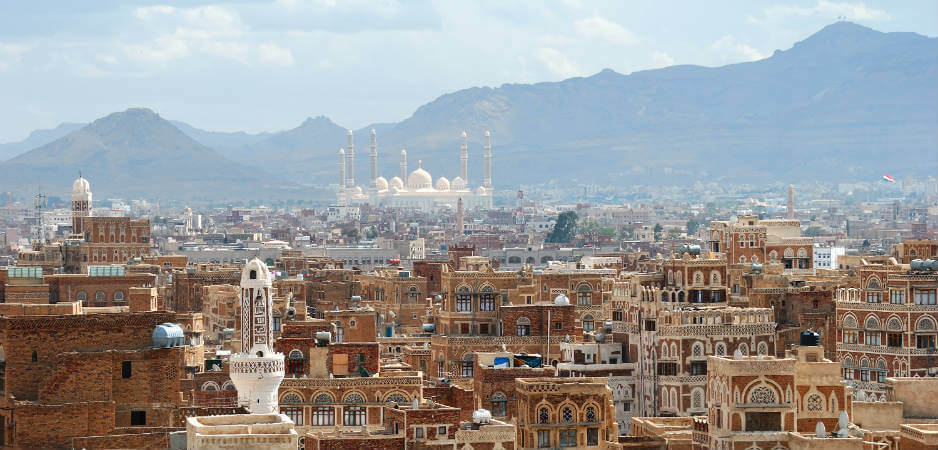Different attitudes toward al-Islah have fueled tensions within the divided Gulf Cooperation Council.
Plagued by more than three years of civil war and a humanitarian disaster, the Yemen crisis rages on with no hope of an end in sight. In 2015, the coalition of Arab and African states led by Saudi Arabia initiated a war against the Houthi rebels, yet today Ansurallah (the dominant Houthi militia) continues to repel the coalition from northern Yemen. Moreover, Ansurallah is bringing the war into Saudi Arabia, most recently evidenced by the November 4 missile launch that the Saudis intercepted over Riyadh.
Although Ansurallah remains the coalition’s principal target, the different states behind the Riyadh-led campaign have differing strategies, which have contributed to the prolongation of Yemen’s civil war. Saudi Arabia continues to back Yemen’s internationally-recognized president, Abdrabbuh Mansour Hadi, although in practice he has extremely limited power in the country. The United Arab Emirates has been highly active throughout what was once officially South Yemen. Abu Dhabi has used the UAE’s military-orientated presence to deliver stability and security, creating and deploying local fighters, such as the Security Belt Forces and Hadrami Elite Forces, which has enabled a civil society to re-emerge, albeit one that increasingly backs Southern cession. Although Riyadh suspended Qatar from the coalition shortly after the Gulf dispute erupted in June, Doha was previously part of the bloc and backed the Yemeni Muslim Brotherhood, al-Islah.
Ultimately, the different Gulf Cooperation Council (GCC) states’ attitudes toward al-Islah have fueled tensions within the divided council. Although Saudi Arabia is boycotting Qatar for numerous reasons, including Doha’s support for the Muslim Brotherhood, in truth Riyadh and Doha have previously, to a certain degree, aligned behind al-Islah in Yemen. As an important political and social institution within Yemen, al-Islah has traditionally been close to Saudi Arabia, and Yemen’s current deputy president, Ali Mohsen al-Ahmar, is a leading personality within the party. Such dynamics have pitted Riyadh against Abu Dhabi, which always saw the local Muslim Brotherhood offshoot as menacing and did not join Saudi Arabia in viewing al-Islah as an actor that should be collaborated with for the purpose of shoring up Sunni forces against the Iranian-backed Houthi rebels.
Increasingly Polarized
With Yemen’s current battle lines drawn between the traditional boundaries of North and South Yemen, the divided communities’ political and ideological affiliations are becoming increasingly polarized. Several prominent Salafists such as Aidarous al-Zubaidi and Hani bin Breik lead the UAE-backed Southern Transition Council (STC), which plays upon South Yemenis’ historical grievances against northern political elites. An important aspect to this strategy is the political and kinetic struggle against al-Islah.
Within a wider UAE struggle against political Islam and the Muslim Brotherhood, Abu Dhabi has aggressively backed the STC’s struggle against al-Islah and extremist groups in South Yemen. Abu Dhabi’s stewardship of local security forces in South Yemen has allowed the Emiratis to influence and direct combat operations against al-Islah, with routine counterterrorism operations conducted throughout Aden and other cities.
Over the past five months, the UAE and its locally-backed figures have accused al-Islah of looting, murdering and attempted insurrection. Multiple raids and arrests, such as the detention of 10 al-Islah members on October 11, including the group’s under-secretary, Mohammed Abdul Malik, have led to increased violence. One such raid on al-Islah’s al-Qalua branch in Aden discovered C4 explosives, detonators, rocket propelled grenades (RPGs), mines and small arms ammunition. Apparent reprisals by al-Islah-affiliated parties have included the assassination of four Salafist imams across Aden in October alone.
In combination with the STC and Security Belt Forces’ focus on combating al-Islah is a continued assault against al-Qaeda in the Arabian Peninsula (AQAP) and the Islamic State (Daesh). Although experts debate al-Islah’s extremist inclinations and relationship with violence, the barbaric acts committed by AQAP and Daesh leave no room for doubt about their self-confessed and self-promoted brands of extremism. These groups have targeted Emirati forces in Yemen despite Abu Dhabi’s close cooperation with Washington on counterterrorism in this war-torn country.
Interpretations of Terrorism
Despite the GCC states’ differing interpretations of terrorism, in October all six members of the council joined the US Department of Treasury in imposing sanctions on 13 individuals suspected of supporting and financing AQAP and Daesh in Yemen. The announcement was timed with the regional visit of US Treasury Secretary Steven Mnuchin to the Gulf. These were the first sanctions imposed via the Riyadh-based Terrorist Financing Targeting Center (TFTC), unveiled during President Donald Trump’s historic visit to Saudi Arabia in May.
As the UAE continues to exert greater influence in Yemen’s southern territories, and with the coalition’s campaign in Yemen already suffering from internal divisions, Riyadh is being pragmatic by distancing itself from al-Islah and other Sunni non-state actors in Yemen, including AQAP. Notable was the inclusion of Yemenis previously backed by the Riyadh-led Arab coalition: Abdel-Wahab Humayqani and Adil Abduh Fari Uthman al-Dhubhani (aka Abu Abbas). Whereas Saudi Arabia previously engaged with certain Sunni Islamist groups and individuals in Yemen within the framework of Riyadh’s quest to counter the Houthis and, by extension, Iranian influence, the kingdom’s new foreign policy trajectory is increasingly aligned with the UAE’s, with Abu Dhabi’s Crown Prince Mohammed bin Zayed at the helm.
In light of the Qatar crisis, as well as stepped up pressure from the Trump administration to target extremists such as AQAP and Daesh in Yemen, the Saudis are seeking to distinguish themselves from Doha, which continues to patronize groups that other GCC states and Egypt view as terrorist organizations.
Previous US sanctions and continued accusations from Saudi and Emirati media outlets have indicted Qatari residents and the state itself from sponsoring AQAP and Daesh in Yemen. While Doha has joined the other five GCC states in imposing last month’s sanctions on 13 Yemeni individuals, the Saudi/UAE-led bloc’s narrative will continue to maintain the message that Doha backs al-Qaeda and other extremists across the Arab world. Due to Qatar’s historical affiliation with extremist financing, Doha will have to continue abiding by international law in combating international terrorism.
The Yemeni crisis is complicated and multifaceted, with many competing outside and local actors attempting to shape the impoverished country on conflicting terms. The recent targeting of certain individuals in Yemen who were once cooperating with GCC states in the struggle against “Persian hegemony” will have an impact on Yemen’s future. Both Saudi Arabia’s new approach to fighting “extremism” while returning to “moderate Islam” and the war of narratives amid the Qatar dispute will influence how Riyadh approaches all the crises along its borders.
*[Gulf State Analytics is a partner institution of Fair Observer. This article was updated on November 19, 2017.]
The views expressed in this article are the author’s own and do not necessarily reflect Fair Observer’s editorial policy.
Photo Credit: Oleg Znamenskiy / Shutterstock.com
Support Fair Observer
We rely on your support for our independence, diversity and quality.
For more than 10 years, Fair Observer has been free, fair and independent. No billionaire owns us, no advertisers control us. We are a reader-supported nonprofit. Unlike many other publications, we keep our content free for readers regardless of where they live or whether they can afford to pay. We have no paywalls and no ads.
In the post-truth era of fake news, echo chambers and filter bubbles, we publish a plurality of perspectives from around the world. Anyone can publish with us, but everyone goes through a rigorous editorial process. So, you get fact-checked, well-reasoned content instead of noise.
We publish 2,500+ voices from 90+ countries. We also conduct education and training programs
on subjects ranging from digital media and journalism to writing and critical thinking. This
doesn’t come cheap. Servers, editors, trainers and web developers cost
money.
Please consider supporting us on a regular basis as a recurring donor or a
sustaining member.
Will you support FO’s journalism?
We rely on your support for our independence, diversity and quality.







